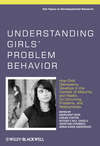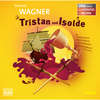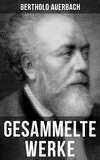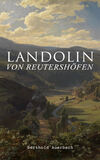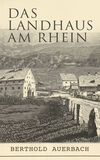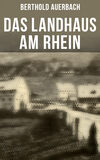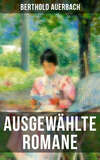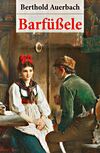Kitabı oku: «Villa Eden: The Country-House on the Rhine», sayfa 25
The boy sat down upon a pile of stones, gazing into vacancy, and listening to the gradual dying away in the distance of the rattling and creaking wagon. For the first time in his life, he represented to himself in imagination the way in which a human being lives. He saw, as in a dream, the teamster arriving at his place of destination, he saw him lying in the shed upon the bundle of hay which he afterwards threw to his horses.
Roland had never yet been so alone, so without attendance, so conscious that no one could call to him; it seemed that he now saw, for the first time, the world and all that is in it. He followed the path of a little beetle, which crept swiftly along the ground and scrambled up a stalk.
Incomprehensible thoughts were stirring in his youthful spirit. What an infinite fulness of existence is the world! In the hedges of wild roses, just opening their buds by the roadside, sat motionless beetles and insects of all kinds, and a great buzzing and humming came from one open flower-cup to another. Here had beetles, butterflies, flies, and spiders spent the night, and the well-roofed snails were quietly housed upon the twigs.
He saw a field-mouse come out of its hole; first it remained resting upon the edge, listening, looking round, moving its chaps, and finally it slipped out, and quickly disappeared into another hole among the grass. A variegated beetle, in the early morning, ran across the field-path, fearing the public road, and feeling perfectly safe only among the thicket of the grain.
A hare ran out, and Devil sprang after him; Roland involuntarily felt at his side to seize hold of his gun.
As if emerging from beneath the surface of an overwhelming flood of impressions, Roland rose up. The sun had risen; he could not endure its splendor, and with eyes fixed upon the ground he went on. But his step lagged, for a voice spoke in him: —
"Turn back to father and mother!" But suddenly he cried aloud, —
"Eric!"
"Eric!" was repeated again in multiple echoes, and Roland walked on now, as if called by the mountains themselves. It seemed to him, not as if he walked, but as if he were lifted up and carried along. The night without sleep, the wine, all that he had experienced, excited his imagination, and it seemed as if he must now meet with something which no one else had ever met with – something inexpressible, incomprehensible, miraculous. He looked round, expecting to see it; something must certainly come to him and say, "For thee have I waited; art thou here at last?" And as he thus looked round, he noticed that the dog had left him. The wood yonder was near, the dog had evidently run after a hare or a wild rabbit. Roland whistled, he wished to call aloud, "Devil! Devil!" but he did not utter the word. He called the old name, "Griffin!" The dog bounded towards him, his tongue lolling from his mouth; he was wet with the dew of the corn-field through which he had run. Roland found it difficult to keep the dog off, for he seemed perfectly happy to have his name again; he looked up intelligently, panting quickly.
"Yes, your name is Griffin!" Roland cried to him. "Now down!" The dog kept close to his feet.
As the road now led through the forest, Roland turned aside, and laid himself down on the moss under a fir-tree; the birds sang over his head, and the cuckoo called. The dog sat near him, and seemed almost jealous that Roland did not vouchsafe him a single glance. Roland parted his jaws, and took delight in the magnificent teeth; then he said, – his own hunger might have made him think of it, —
"The next place we come to where there's a butcher, you shall have a sausage."
The dog licked his chaps, jumped round and round as if he understood the words, chased the crows which were that early looking for their food in the field, and barked at the rising sun.
The tired boy was soon asleep; the dog placed himself by his side, but he knew his duty, and did not lie down; he remained sitting, and resisted sleep. Occasionally he winked, however, as if it were hard work to keep his weary eyes open; then he shook his head, and kept faithful watch by his master. Suddenly Roland awoke. A child's voice awakened him.
CHAPTER XIII.
THE LILY OF THE VALLEY
Roland rubbed his eyes; before him stood a child, a little girl in a snow-while dress and blue sash. Her face was rosy, great blue eyes beamed out from it, and long golden curls hung loose over her neck. In her hand she held a bunch of wild-flowers.
Griffin stood in front of the child, and kept her from coming nearer.
"Back, Griffin!" cried Roland, rising; the dog fell behind his master.
"This is the German forest!" said the child with a foreign accent, and a voice that might belong to a princess in a fairy tale. "This is the German forest! I have only been gathering flowers. Are you the forest prince?"
"No, but who are you?"
"I have come from America. My uncle brought me here this morning, and now I am to stay in Germany."
"Come, Lilian! Where are you staying so long?" cried a man's voice from the road.
Roland saw through the trees an open carriage, and a tall, stately gentleman with snow-white hair.
"I'm coming directly," answered the child; "I have some beautiful flowers."
"Here, take this one from me," said Roland, gathering a full-blown lily of the valley.
The little girl threw down all the flowers which she held, took Roland's, cried, "Good-bye," and ran to the carriage. The man lifted her in as she pointed back to the wood; the carriage rolled away, and Roland stood once more alone.
Whoever could then have looked down from the vault of heaven would have seen a marvel, for at the very moment when the child was talking with Roland, Sonnenkamp stood on the terrace, lost in thoughts which made him shiver in the frosty morning air.
Roland pressed his hand to his brow. Had it really happened, or had he only dreamed? He still heard the roll of the carriage in the distance, and the plucked flowers on the ground bore witness that he was living in the actual world. But had the child really said that she was from America? Why had he not followed her then? Why had he not spoken to the old man? And now no one could tell him who they were, and whither the child had gone.
For a while Roland gazed at the flowers before him, but picked up none of them. Griffin barked at him, as if to say, Yes, and men assert that there are no more miracles! He sniffed round the gathered flowers, then ran off on the track of the child and of the carriage, as if he wished to fulfil his master's desire to detain the people, that he might talk with them. Roland whistled and called him; Griffin came, and Roland reproved him: —
"You don't deserve to have any sausage, you are so unfaithful."
Griffin lay down beseechingly at his feet; he could not explain how good his intention had been.
"Well, now we will go," said Roland. And they took up their march again.
He heard the whistle of a locomotive in the distance, and went in that direction. The wood was soon passed, and the road led again through vineyards. On a side-path Roland saw several women carrying powdered slate, from a great heap, into a newly-planted vineyard. On its border, near a hedge, burned a fire, close to which stood pots, whose contents an old woman was stirring with a dry bough. Roland stopped, and the old woman called out to ask him to join them; he went up to the group, and saw that coffee was boiling. The other women, young and old, came nearer, and there was much jesting and laughter. They turned their baskets up and sat upon them; such a seat was also prepared for Roland, and a sort of cushion placed upon it, as they asked him whether he were not a prince. Roland answered, no; but it flattered him to be taken for a prince in this way; he was very condescending, and knew how to joke with his companions. An old vine-dresser, the director of the work, told Roland, whom he held in some regard as being of the masculine gender, that he drank no coffee: it was a stupid custom, which sent money out of the country to America, never to come back.
Roland was struck by this second mention of America. The whole party listened attentively when he told them that it was not coffee, but sugar, which came from America.
"And our sugar," said the old woman, "has all staid in America, for we haven't any."
The first cup, and the cream off the milk, were given to Roland, with a bit of black bread. He wished to give the people something in payment, but now discovered that he had not his porte-monnaie about him. He knew that he had had it in the inn; the knavish-looking hostler must certainly have stolen it from him. He soon overcame his trouble about the lost money, however, and told the people that, some time or other, he would show kindness to a stranger, in return for what he had received.
He wandered on. He had learned what it was to enjoy the kindness and bounty of poor men, now that he was himself poor and helpless; that was his best experience.
The world is beautiful and men are good, even if a hostler could not resist a well-filled purse. With these cheering thoughts, he went on his way and soon reached the railway-station. Ha had carefully avoided any of the nearer stations, where he was known and might easily be traced; he wished, after making a circuit, to take the cars at a distant point.
Here Roland was accosted, like an old acquaintance, by a man in worn-out clothes, and with one boot and one old slipper on his feet.
"Good-morning, my dear Baron! good-morning!" cried this shabby-looking personage, coming close up to him.
It was doubly disagreeable in this fresh morning, after such a night, to come within the atmosphere of this man so impregnated with brandy, who was excessively confiding in his manner towards Roland. A railway official, in the most polite manner, begged the half-drunken fellow to leave the traveller in peace; he nodded knowingly to Roland from a distance, as if there were some important secret between them. Roland learned that the man belonged to a respected family of the nobility: his relations had wished to help him, and had made him an annual allowance, but it was of no use. Now he was boarding with a baggage-master, and his whole amusement was in the railroad. Every one showed him due respect, because he was a baron, and very much to be pitied.
Roland shrank from the man as if he were a ghost. The excitement of the night, and of all which he had been through, was still affecting him, yet the thought was present to him how strange it was that a half-witted, half-intoxicated man should be so respectfully treated, simply because he was a baron.
Roland succeeded in borrowing money for his journey from the restorator at the station, with whom he left his diamond ring in pawn. He bought a ticket for the university-town, and at last took his seat in the car, where he could not refrain from saying to a fellow-passenger, —
"Ah! it is good that we are off."
His neighbor stared at him; he could not know how happy it made the sorely weary boy, to be carried along towards Eric without any effort of his own.
"Where lies your way, Herr Baron?" asked the neighbor,
Roland named his destination, but looked in surprise at the man who called him Baron; had he become one in the course of the night? At a junction, where a new set of officials took charge of the train, his neighbor, who was leaving it, said to one of them, —
"Attend to the young Baron, who is sitting there."
Roland was pleased to be so called, and a peculiar feeling came over him of the satisfaction one must have in being really a baron; then one would have a lasting title with lasting honors in the world. The thought only passed through his mind, and quickly vanished, as he began directly to imagine Eric's pleasure at seeing him; his face glowed with impatience and longing.
Suddenly a painful thought struck him. Where had he left the dog? He had quite lost or forgotten him. But on rolled the cars through valleys, cuts, and tunnels, and it seemed to Roland a year, since he left his home.
Not far from the university, where the road again divided, some students entered the train. They soon let their fellow-passengers understand that they had performed the great exploit of drinking a May-bowl at their fathers' expense: for anybody could drink native wine. They had also brought some provision into the car, and in their generosity or their ostentation they wanted Roland to drink with them, but he declined with as much modesty as decision.
Twilight had gathered when they reached the university-town.
Roland asked for Doctor Dournay; one of the students, a fine-looking youth who had kept aloof from the noisy party, told him to come with him, as he lived near the widow of the professor. As Roland went with him, a strange fear came upon him: what if he could not find Eric? or if Eric would have nothing more to do with him? How much might have happened since they parted!
With beating heart he ascended the steep, dark, wooden staircase. At the top, the door of a room opened, and at the door stood a woman, who asked, —
"Whom do you wish to see?"
"The Herr Captain Dournay."
"He is away from home."
CHAPTER XIV.
A NEW SON
Roland asked to be allowed to come in and wait, and was led into the sitting-room; the servant maid told him that Eric had gone to the capital, but might possibly return that day. His mother had gone to the grave of a son, of whose death this was the anniversary. The maid went out to light the lamp, and Roland was alone in the room where the twilight shadows gathered; he sat in the corner of a sofa, weary, and his mind full of varied thoughts.
Wonderful! there are so many human dwellings in the world, one can enter them, and all at once one is seated in a strange house.
Outside, in accordance with an old custom, there sounded from the tower a choral, played by trumpets. Roland dreamed of the outer world, no longer conscious where he was, but remembering only that he had once travelled through many countries and towns, and that everywhere in the houses lived men, who led their own lives, of which other people knew nothing.
Eric's mother entered. She stopped at the door, as Roland rose, saying, —
"Good-evening, mother."
Stretching out her arms, the mother cried, —
"In Heaven's name, Hermann – thou?"
"My name is not Hermann. I am Roland."
The mother approached him trembling; just then the aunt came in with a light, and all was explained. Roland said that he had followed Eric, because he wished never to leave him. The mother kissed him, weeping and sobbing.
Steps were heard on the stairs, and Eric entered. Roland had no strength to rise from his seat as Eric exclaimed, —
"You – here!"
Roland could hardly utter the words to explain what he had done. He stared wildly at Eric, who stood before him like a stranger, without even holding out his hand. As soon as Roland had finished speaking, Eric said sternly, —
"If you were my son, I would punish you severely for your self-will, and the anxiety you have caused your family."
"You may punish me, I will not stir. No one in the world could punish me like you; you do not punish like-"
The beating of his heart prevented his finishing what he was about to say, and perhaps also an aversion to complaining of his father restrained him. He had forgotten till now what had last incited him to run away, and only remembered the longing for Eric; now he looked around him, as if he saw his father's upraised hand in the air.
The mother took him again into her arms, saying, —
"Your willingness to bear punishment atones for and washes out everything."
"Stay here with my mother," said Eric, sternly; "I will come back directly." He hurried out, and sent a telegram to Herr Sonnenkamp, with the inquiry whether he would come for Roland, or wished to have him brought home.
When Eric returned, he found Roland already asleep on the sofa. He was tired out, and it was with great difficulty that they could awaken him to be put to bed. Eric sat a long time with his mother, talking of the wonderful manner in which fate seemed playing with them.
His mother related how, as she came from the churchyard, the painful thought had oppressed her that even she, his own mother, could not quite recall how Hermann had looked. She could bring his face to mind, because it was preserved in the photograph which hung, in its frame of immortelles, just over her sewing-machine in the bay-window. But Hermann's motions, his gait, his way of throwing back his head with its thick brown hair, of laughing, jesting, and caressing; the sound of his voice, the low, dove-like laugh, – all these had vanished from her – his mother. So she had walked on, with downcast eyes, often stopping, as she tried hard to call up the image of the lost one. So she had come home, and here came to meet her a form like Hermann, and it had cried out to her, – "Good-evening, mother!" in his very tone. She could not tell why she had not fainted, and she spoke now of Roland with the same delight which Eric had felt when he saw him for the first time.
Eric, on his side, told her of the reasons for and against undertaking the school, and then of the Minister's offer. He would there enter a position which his father had not reached, and which would, perhaps, have saved his life. The idea of receiving an appointment by inheritance, and through favor, without any merit of his own, oppressed him somewhat.
His mother soothed both these scruples, which were really one, and quite uncalled for, as he had the right to collect the debt which was due to his father, and still more if it was over due.
Very lightly she touched upon the good fortune of the nobility, in being able to receive what had been stored up by past generations, and to hand it down to future descendants. With a slightly jesting tone she said, —
"Our professor of political economy used to say that capital was accumulated labor; so family standing is nothing but accumulated honor."
There were times, though they were rare, when the mother, from the standpoint of her inherited opinions and habits, saw in many of the sentiments and views of the burgher class an obstinate and perverse independence which she could not approve. In her husband this had rarely and slightly shown itself, but in Eric it was more active; he had that haughty self-reliance which makes a man unwilling to thank any one but himself for his position and power.
She had never repented leaving her own class to marry her husband, she had been too happy for that; but she saw in Eric's position something like a grievous consequence of her own act. Moved by these thoughts, which she never expressed, she said, —
"I can easily understand how you feel drawn to this American; there is the greatest honor in being a self-made man. Let us unite the two plans then. You can bring it about, since the boy is in your hands, that the American shall entrust him to you, and you can at the same time maintain an independent position."
Eric replied that his objection to the situation did not consist simply in his receiving it as a favor; the task of conducting foreign visitors of princely rank through the art-collections was distasteful to him; he did not think that he could conform himself to it.
Suddenly his mother remembered that a letter had come for him, and she gave it to him. It was from Clodwig. The noble man placed at Eric's disposal twice the sum that he had asked for. Eric was made happy by this news, and his mother nodded with hearty assent when he said that the gift rejoiced him, but still more did the assurance that his confidence in men had met with so glorious a confirmation.
Midnight was past, and mother and son still sat together. Eric begged his mother to go to bed and leave him to wait for Sonnenkamp's reply. He sat long alone in the night, thinking over all which had passed, till sleep overcame him.
In the spirits of men, as well as in the history of nations, thoughts and sentiments are formed which are to be brought into action from their own free will, when suddenly there comes an over-mastering fact, which converts the free choice into an inevitable necessity. Thus Eric's entrance into Sonnenkamp's household seemed to have been made an unavoidable necessity by Roland's rash step.
Eric went again, with scarcely audible steps, into the boy's room. So wholly was his spirit turned toward him that the sleeping child moaned, "Eric," but soon, turning over, slept soundly again.
Eric went back to the sitting-room, and then it first occurred to him that there was no night-watch at the telegraph office in Sonnenkamp's neighborhood; the father could not receive the news till morning. Eric also now went to bed.
Everything was late in the house of the professor's wife the next morning; Eric slept longest. When he entered the sitting-room, he found Roland already with his mother, holding a small wooden coffee-mill in his left hand and turning it with his right. This mill was an heir-loom which had belonged to Eric's grandfather, who had been a distinguished anatomist at the university. The mother had already told Roland this, and had shown him all sorts of ancient household furniture, also relics of the times of the Huguenots.
"Ah, how pleasant it is here with you!" cried Roland to Eric, as he entered.
Something of long-established family existence opened upon the young spirit, and, at this morning hour, with the friendly eyes of three people resting upon him, Roland felt very content in the simple, old-fashioned, domestic life.

